
If you are a homeowner or looking to buy your first home, you may be concerned about whether a home insurance company can drop you and what happens if you lose coverage. Since homeowners insurance may be required by a mortgage lender, getting dropped by an insurance company can be a concern. To help you through this process, we cover when and why a home insurance company may cancel a policy, how you can avoid having your insurance canceled and how you can obtain insurance after losing coverage.
In most cases, an insurance company can choose not to renew your home insurance policy when it expires, but they cannot cancel your policy in the middle of the term unless you have committed fraud or misrepresented yourself on the application. However, state laws vary, and there may be exceptions to this rule, such as if you fail to pay your premiums on time or if your home becomes uninsurable due to damage.
There are a few reasons why an insurance company may choose not to renew your policy when it expires. For example, if you have filed a large number of claims or have made a high-value claim, the insurance company may see you as a higher risk and may choose not to renew your policy. Alternatively, if your home has fallen into disrepair or if you have made significant changes to the property that increase its risk, such as adding a trampoline or pool, the insurance company may decide not to renew your policy.

If your home insurance company chooses not to renew your policy, they must provide you with notice before the policy expires. At this point, you can shop around for a new insurance policy to ensure that you have continuous coverage.
Home insurance cancellation and non-renewal are two different concepts that refer to when an insurance policy ends, but they have different implications for the policyholder.
Cancellation refers to the termination of an insurance policy before its expiration date. The insurance company may cancel the policy for several reasons, including non-payment of premiums, misrepresentation of information on the application or fraudulent activity. In this case, you may receive a notice of cancellation and your policy may end on a specified date. A canceled policy can negatively impact your ability to obtain insurance in the future.
Non-renewal, on the other hand, refers to the insurance company’s decision not to renew a policy when it expires. The insurance company may choose not to renew the policy for various reasons, such as a high number of claims or an increased risk associated with the property. A non-renewed policy does not affect your ability to obtain insurance in the future, but it may make finding coverage with the same insurer more challenging.
An insurance company may drop or choose not to renew your home insurance policy for a variety of reasons. Below are some common examples:
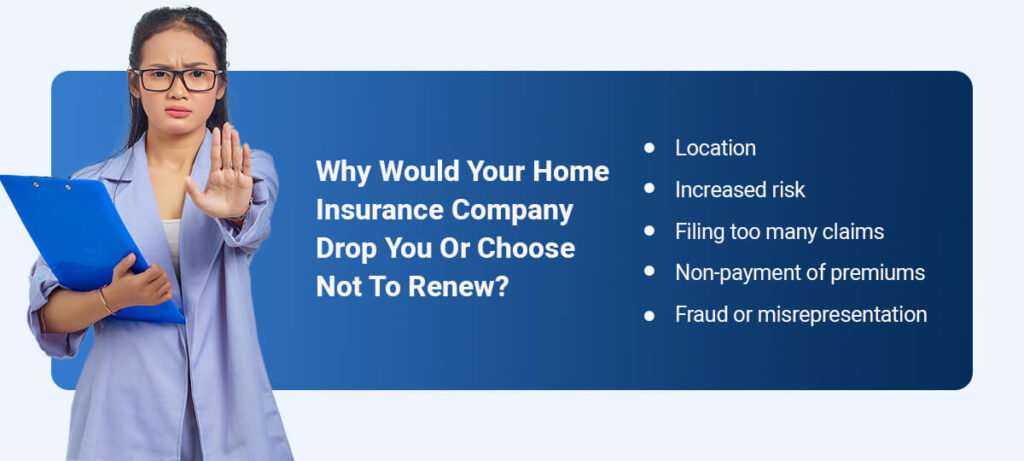
State laws vary, and there may be exceptions to the reasons listed above. If you receive a notice of cancellation or non-renewal, it is essential to contact your insurance company to understand the reason for the action and determine if there are any steps you can take to keep your coverage or find alternative insurance options.
When your home insurance is canceled, your coverage ends on the date specified in the notice of cancellation. This means you will no longer have insurance protection for your home or personal belongings, leaving you financially exposed in case of unexpected events such as fire, theft or weather-related damage.
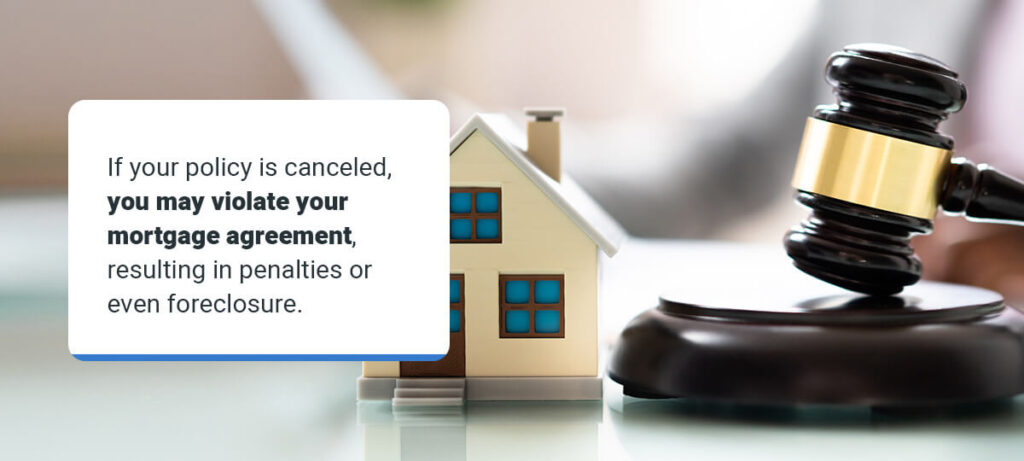
Moreover, if you have a mortgage on your home, your lender will typically require you to have insurance coverage at all times. If your policy is canceled, you may violate your mortgage agreement, resulting in penalties or even foreclosure.
In some cases, if you have a history of canceled policies or have difficulty finding insurance coverage, you may be classified as high-risk, which can make it more challenging to obtain coverage in the future. You may also be required to pay higher premiums or face coverage limitations.
If your policy is canceled, it is essential to act quickly and contact your insurance company to understand the reason for the cancellation and determine if there are any steps you can take to keep your coverage or find alternative insurance options.
If your home insurance is canceled or dropped, there are a few steps you can take to try to keep your coverage or find alternative insurance options:

Remember, it is essential to act quickly if your policy is canceled or dropped to avoid a lapse in coverage and ensure that you are protected in case of unexpected events.
If you have lost your homeowners insurance coverage, there are steps you can take to obtain coverage:

Get a Free Homeowners Insurance Quote!
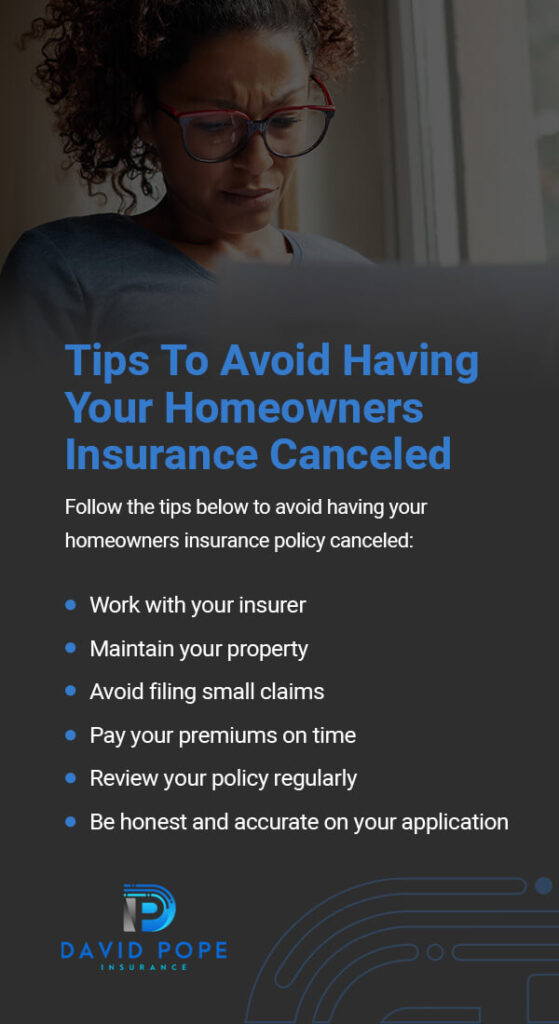
Follow the tips below to avoid having your homeowners insurance policy canceled:
By following these tips, you can help reduce the risk of having your homeowners insurance canceled and ensure that you are protected in case of unexpected events.
Have Questions? Contact Us Today!
For more information, review some of our frequently asked questions about homeowners insurance cancellation below.
Yes, you may be able to contest a homeowners insurance cancellation, depending on the circumstances of the cancellation and the specific provisions in your insurance policy.
If your homeowners insurance policy is canceled by the insurance company, they are required to provide you with a written explanation for the cancellation. If you believe that the cancellation was made in error or that the reason provided is not valid, you can contest the cancellation by contacting your insurance company and providing additional information to support your case.
If you are unable to resolve the issue with your insurance company, you may also be able to file a complaint with your state’s insurance regulator or seek legal counsel to determine your options for challenging the cancellation. Review your insurance policy and understand your rights and obligations as a policyholder to ensure that you are fully informed about the cancellation process and your options for appeal.
The length of time that a canceled homeowners insurance policy remains on your record can vary depending on the specific circumstances of the cancellation and the policies of your insurance company and state regulator.
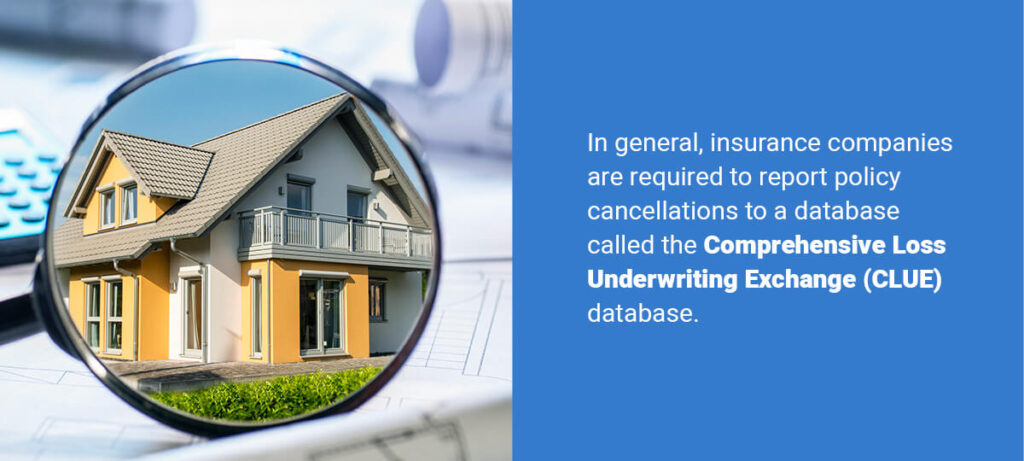
In general, insurance companies are required to report policy cancellations to a database called the Comprehensive Loss Underwriting Exchange (CLUE) database. The information in the CLUE database can be used by other insurance companies to assess your risk and determine your eligibility for coverage.
However, if the cancellation was due to non-payment of premiums or other administrative reasons, it may not be reported to the CLUE database. Additionally, some states have laws limiting the length of time certain types of information can be included in an individual’s insurance record.
If you are concerned about the impact of a canceled homeowners insurance policy on your record, you may want to review your state’s insurance regulations or consult an insurance professional to better understand your rights and options.
Obtaining homeowners insurance may be more difficult if your roof is in poor condition or needs repairs. Many insurance companies consider the condition of a home’s roof when underwriting a policy, as a damaged or aging roof can increase the risk of damage from weather events like wind or hail.
However, it is still possible to obtain homeowners insurance with a bad roof. Some insurance companies may require you to provide proof that the roof has been repaired or replaced before they will provide coverage, while others may offer coverage with certain conditions or limitations on coverage for damage related to the roof.
Be upfront and honest with your insurance company about the condition of your roof when applying for coverage, as providing false or misleading information can result in a denial of coverage or cancellation of your policy.
If you are having difficulty obtaining coverage due to the condition of your roof, you may want to consider working with an insurance broker who specializes in high-risk policies, as they may be able to help you find coverage options that meet your needs. Additionally, it is important to address any roof issues as soon as possible to minimize the risk of damage and potentially reduce the cost of insurance coverage.
If your homeowners insurance is canceled, it can have a significant impact on your mortgage. Most mortgage lenders require borrowers to maintain adequate homeowners insurance coverage as a condition of the loan, as the insurance policy protects the lender’s interest in the property. If your insurance is canceled, it is likely that your lender will become aware of the cancellation and take action to protect their investment in the property.
If you do not obtain new homeowners insurance coverage, your lender may purchase a force-placed insurance policy on your behalf. Force-placed insurance is typically more expensive and offers less coverage than a standard homeowners insurance policy, and the cost of the insurance may be added to your mortgage payments.
In some cases, if you fail to obtain adequate insurance coverage, your lender may declare you in default on your mortgage and initiate foreclosure proceedings. This can result in the loss of your home and damage to your credit.
To avoid these potential consequences, maintain adequate homeowners insurance coverage and promptly address any issues that may arise with your policy. If your insurance is canceled, work with your insurance company and lender to obtain new coverage as soon as possible to protect your home and your investment in the property.
In some cases, it is possible for a homeowners insurance company to drop you in the middle of your policy term, although there are specific conditions that must be met for this to occur.
Typically, an insurance company can only cancel a homeowners insurance policy in the middle of the policy term if the policyholder has violated the terms of the policy, such as by failing to pay premiums, making fraudulent claims or misrepresenting information on the application. Additionally, some insurance companies may cancel a policy if they determine that the property presents an unacceptable risk, such as if the property has fallen into disrepair or has a history of multiple claims.
If your insurance company does decide to cancel your policy in the middle of the term, they may be required to provide you with written notice of the cancellation and the reason for the cancellation. In most cases, you will also be entitled to a prorated refund of any premiums you have already paid.
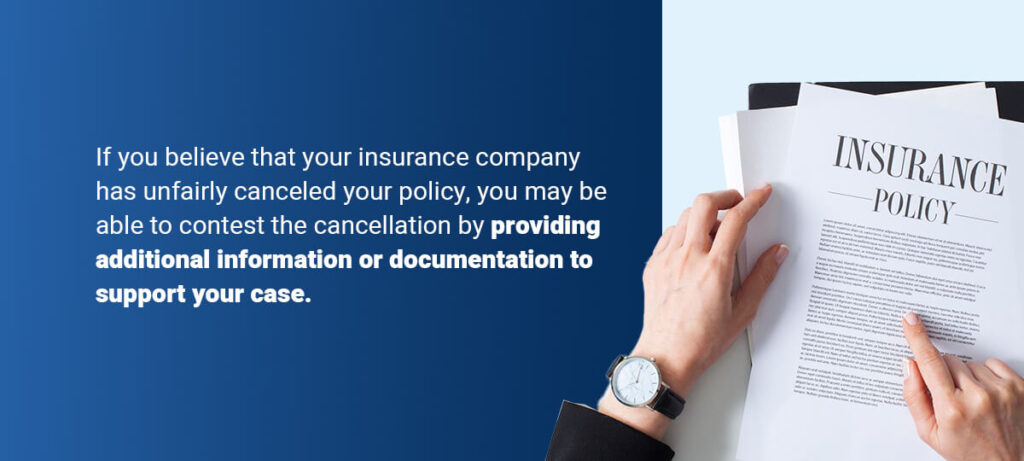
If you believe that your insurance company has unfairly canceled your policy, you may be able to contest the cancellation by providing additional information or documentation to support your case. You may also want to consult with an insurance professional or legal counsel to better understand your rights and options in this situation.
There is no set number of claims that will result in an insurance company dropping you from a home insurance policy. The decision to drop a policyholder is typically based on the frequency and severity of claims, the type of claims filed and the overall risk profile of the policyholder.
Typically, insurance companies prefer policyholders who file few or no claims, as frequent claims can be a signal that the policyholder is a higher risk. However, every insurance company has its own underwriting guidelines and policies regarding claim activity, so it is difficult to give a specific answer to this question without more information about your individual circumstances and insurance provider. Review the terms of your policy and contact your insurance provider directly to learn more about their policies on claims activity.

At David Pope Insurance, we can help you gain financial stability by getting you the lowest rates on the market for homeowners insurance. We have been meeting our policyholders’ personal and commercial insurance needs since 2005. Contact us at David Pope Insurance today to learn more about our home insurance.